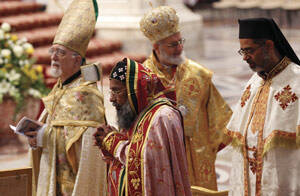Eastern bishops at the Synod of Bishops for the Middle East, assembled at the Vatican from Oct. 10 to Oct. 24, began their extraordinary meeting with expressions of concern for the future viability of the Christian presence in the region and a call for religious freedom in the Middle East. “We must emerge from a logic in defense of the rights of Christians only and engage in the defense of the rights of all,” said the introduction to the synod prepared and read by the Coptic patriarch Antonios Naguib of Alexandria, Egypt, the synod’s recording secretary.
But freedom to practice their faith within different Middle Eastern societies was not the only church freedom the bishops sought. Within the Catholic Church itself, the Eastern bishops demanded greater respect for Eastern authority and tradition. Many bishops protested the lack of autonomy their churches experience and suggested that structural reforms would be required to preserve the identity, authority and heritage of the 22 Eastern churches.
Six different churches from the Middle East were represented in the synod: Armenian, Chaldean, Coptic, Maronite, Melkite and Syrian. As the synod opened, various prelates from those churches proposed that patriarchs and other heads of Eastern churches should have authority over their communities all around the world, not just in regions of origin. The bishops also argued that Eastern churches in Europe, North America and elsewhere should be allowed to have married priests, according to their tradition, anywhere it takes root and not just within their historical Middle Eastern boundaries.
The Eastern Catholic churches have their own canon law and disciplines, their own liturgies, spiritualities, histories and heritage. While they tend to be identified with one country or geographical region, many of them now find that the majority of their faithful live abroad. Bishop Vartan Waldir Boghossian, the Argentina-based bishop for Armenian Catholics in Latin America, used paticularly strong language regarding limits placed on Catholic patriarchs. He said, “Of the 23 churches in their own right that make up the Catholic Church, only one—the Latin church—is not subject to this limitation” of its authority within the bounds of its ancient geographical borders. For example, while the bishops of the Armenian Catholic Church elect bishops for dioceses in Armenia, it is the pope who selects Armenian bishops for dioceses in the United States or Australia.
Antonios Aziz Mina, the Coptic bishop of Guizeh, Egypt, said that especially when there are more faithful of an Eastern church living outside than inside the church’s territory, “it is not entirely logical that some faithful who belong to a sui iuris church have no relationship with the church they belong to, other than liturgically.
“My request is that the patriarch be granted personal jurisdiction over the faithful of his church wherever they might be,” he said. The Coptic bishop also asked Pope Benedict XVI to revoke a decision made in the 1930s that Eastern churches can ordain married men only in their homelands.
The Eastern bishops said that Eastern patriarchs should automatically have the right to cast votes in papal elections and should even take precedence over cardinals. They requested that the process of papal approval of the election of bishops by the synods of Eastern churches should be simplified and accelerated.








